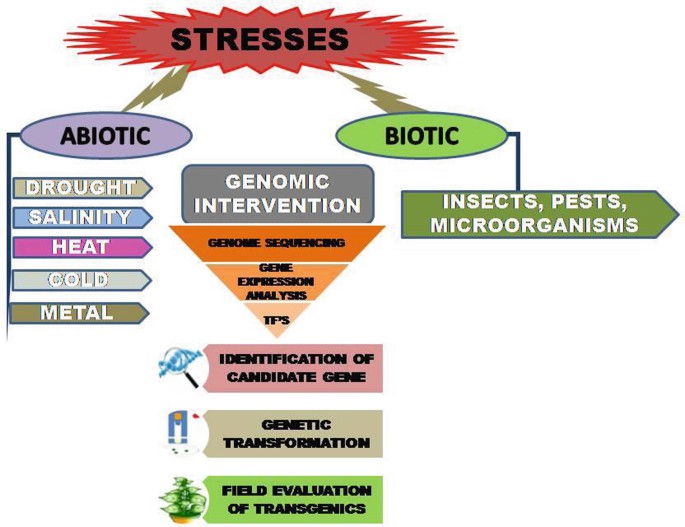Forage plants are subjected to many abiotic stresses during their growth and development, including salinity, drought, temperature extremes, and oxidative stress, which are major constraints on forage productivity. To face these harsh survival stresses, forage plants have developed precise and complex tolerance mechanisms at the morphological, physiological, and molecular levels. For example, forage plants can reduce water loss by changing the shape of their leaves and root systems and resist stress through respiration, photosynthetic metabolism, and osmoregulation. All these changes are related to gene expression. The complex responses of plants to abiotic stresses involve many genetic and molecular mechanisms. In the past decades, scientists have identified multiple genes that respond to abiotic stress, one that directly protects plants from stress and another that consists of contained protein factors involved in the regulation of signal transduction.
 Fig.1. Use of Genomics to Improve Stress Tolerance. (Mahajan R, et al., 2022)
Fig.1. Use of Genomics to Improve Stress Tolerance. (Mahajan R, et al., 2022)
The response of forage grasses to abiotic stress involves many genetic and molecular mechanisms, as well as stress-related genes, proteins, and metabolites from a complex regulatory network. We help customers worldwide to identify many forage genomic regions associated with important traits related to abiotic stress tolerance. Our next-generation sequencing (NGS) technology platform allows large-scale sequencing of genomes and transcriptomes, yielding vast amounts of genomic information. NGS data analysis through bioinformatics can lead to the discovery of novel genes and regulatory sequences that control abiotic stresses. In addition, we combine transcriptomics, metabolomics, and proteomics to identify novel metabolites in specific forage grasses.
As an ideal partner for forage research, Lifeasible offers a molecular genetic analysis of forage crops for resistance by identifying genes that confer tolerance to abiotic stresses in forage grasses. These genes can be used to understand the molecular mechanisms forage grasses respond to the environment and accelerate crop improvement. We identify forage abiotic stress tolerance genes, including but not limited to:
In addition, we provide forage xenogenomics services to isolate and identify genes for abiotic stress tolerance in forage grasses, including gene discovery through the high-throughput expression of sequence tags (EST) sequencing and large-scale simultaneous gene expression analysis using EST-based microarrays. This approach is particularly suitable for discovering novel genes and determining their expression patterns in response to specific abiotic stresses.
We identified a large number of forage genes associated with abiotic stress. These candidate stress-related genes help you understand the molecular mechanisms of stress tolerance in forage grasses and contribute to the development of forage plant varieties with higher stress tolerance and productivity under unfavorable conditions. We are specialized in the discovery and validation of candidate genes for forage stress tolerance. For more information or to discuss in detail, please contact us.
Reference